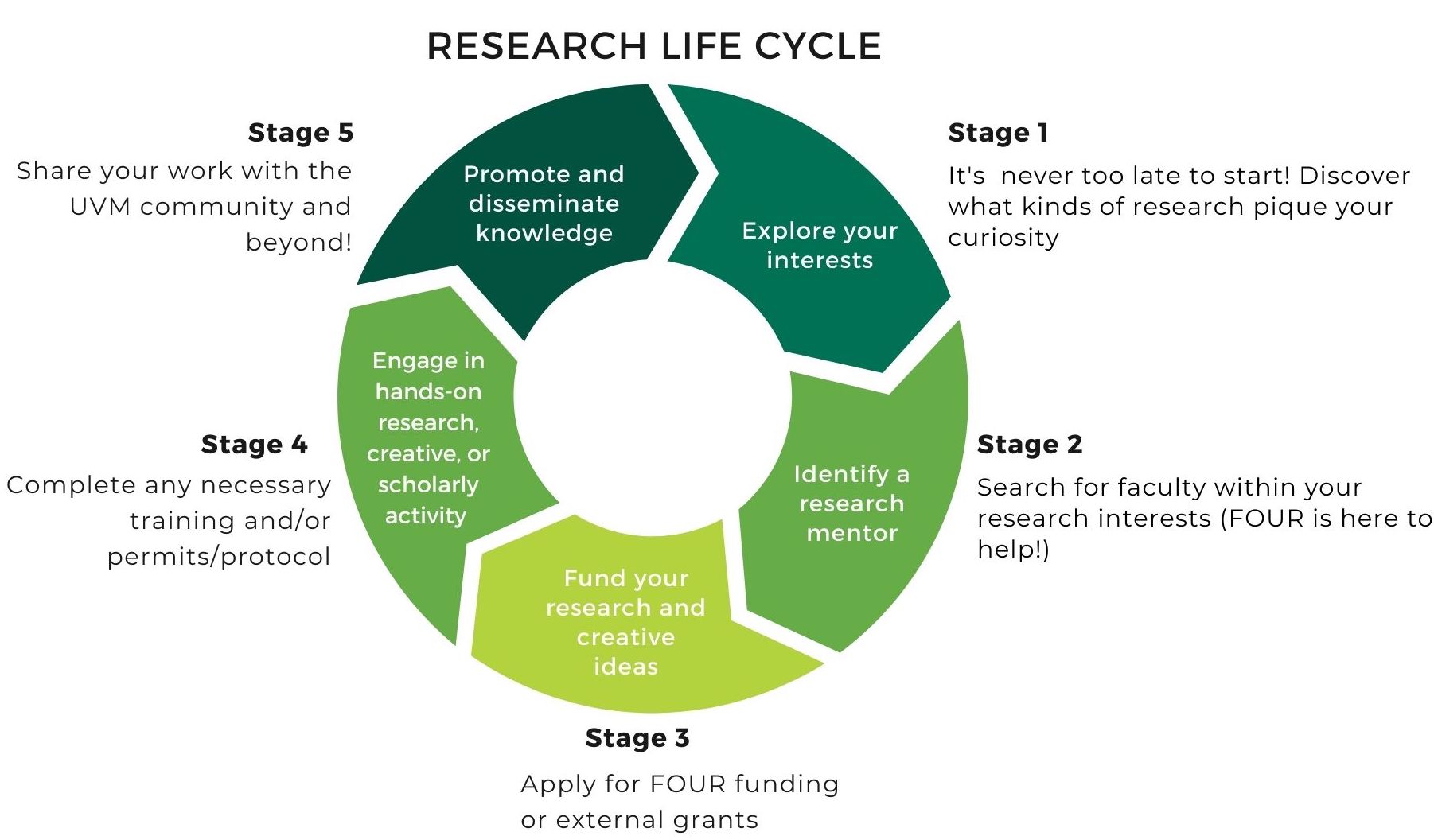Getting started in research
FOUR is a student-centric resource office for students at every step of their scholarly development. Below find links to content that will aid you at every stage of the research process. From getting started to getting published, FOUR can help whenever you are ready.

Getting Started
- Learn how to find faculty and hone your research interests
- Learn how to effectively contact potential research mentors
Finding Faculty & Honing Your Interests
- Sometimes you know that you want to do research but you have no idea what you want to do. There are two ways to go about solving this problem. The first is to consider your interests, what do you watch and what do you read and what do you listen to in your spare time? Consider whether any of these things be converted into a research project. When taking the first route, you want to begin the steps below with those interests in mind. The second way is to follow the process below with an eye for what piques your curiousity to know more.
- Start by checking out your major department. No matter your major, start with your department and look at the Faculty page. Look through the profiles of faculty and see their general interests or research topics. If they align with your own interests, check out their CV. A Curriculum Vita (CV) is a detailed resume that includes their entire professional career including all speaking engagements, publications, grants, etc. Keep an eye out for recent publications and grants, those two things will give you a better idea of what that faculty member is studying right now. Research interests change but typically if someone was being funded recently, the title of the project for that grant is likely (even if only tangentially) related to their current research.
- Check out related departments' faculty lists. Say you are interested in mammals? Look at Biology, Animal Science, etc. to see if they have faculty research in your interest area. Cancer? Consider the Larner College of Medicine, CALS has Microbiology and Molecular Genetics and Medical & Radiation Laboratory Sciences, what about Animal Science? Think about the big picture and then consider which fields may overlap with your own.
- Narrow it down. Create a list of 3-5 faculty members that you are eager to work with.
- Contact.
Contacting Faculty
- Personalize each email. Never send a mass email to faculty and don’t be generic in your approach so that it applies to a lot of faculty members. Take the time to really craft and hone your email so that the faculty member can recognize that you are thorough, detail-oriented, professional and most of all, interested.
- Start with a title. Even if you have had class with a faculty member, until they make it profusely clear, do not call faculty members by their first names. Depending on their degree (find it in the CV), call them Doctor or Professor LASTNAME. This is basic professionalism and it goes a long way in establishing your respect of that faculty member.
- Be brief and straight to the point and get that point across in the first line. When anyone (even I) receive an email from someone we do not know, we skim the first couple of sentences to establish exactly what they are contacting us regarding. Do not start your email with something that is a waste of time, such as your name (it's in the email already) and hold off on details in regards to yourself until you have their attention. Start out with the ask, which you have to decide on beforehand. Whatever you are asking, make it clear - be it a volunteer or for-credit research position for the coming/current semester, or an opportunity to ask about a person’s research more in depth, etc.
- Show your inner nerd. Do not hesitate to show your enthusiasm for a faculty member’s research. Just as we love to hear that we have something in common with someone, they love to hear that you are equally as enthused about their subject. Feel free to include a short anecdote of where your interest was sparked it will only back up your excitement.
- Lastly, state your experience. No one expects an undergraduate to have a full research resume but you have been learning over your time at UVM thus far and the labs and courses you have taken have established some background that is necessary in a research setting. So feel free to say something like “I learned the proper technique for…. In my lab in… I would really like to apply those skills in a practical setting”. If you are a first year student and don't have any or have little coursework behind you, spotlight that as your positive attribute. You are ready to learn and you're a blank slate, no bad habits to break and more potential years ahead of you as a research assistant.
Got Research? Get Funded!
- Get your research expenses covered or apply for a summer stipend.
- See what other students have done with their funding. Check out virtual presentations from the 2020 and 2021 Student Research Conference.
